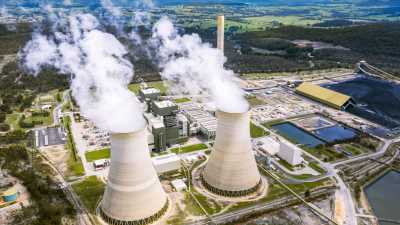Save articles for later
Add articles to your saved list and come back to them any time.
Coal power’s economic viability is collapsing faster than expected, according to the latest electricity grid road map, as plant failures combine with an east coast heatwave to spur requests for households to reduce their energy use.
The Australian Energy Market Operator on Friday forecast the last coal plant would shut in 2038, five years earlier than it expected just two years ago, with cheaper renewables undercutting fossil fuel profitability.
EnergyAustralia said a boiler tube leak put one of two units out of action at the Mount Piper coal plant in Lithgow, NSW.Credit: Getty
“Coal-fired generators, the ageing workhorses of Australia’s electricity supply, are now retiring. They are less reliable, more difficult to maintain and less competitive against firmed renewable supply,” the operator said in its biennial integrated system plan, which assesses trends in the energy market and details likely outcomes until 2050.
The plan’s release comes amid an early summer heatwave across the eastern seaboard, with the risk of blackouts heightened by a string of coal plant outages. Eight generation units across five coal plants are currently offline.
NSW Energy Minister Penny Sharpe on Thursday urged households to cut their electricity use in the late afternoon – when many workers return home and crank up air-conditioners – to reduce the risk of power outages. High temperatures are expected to continue into next week.
EnergyAustralia said a boiler tube leak had put one of two units out of action at the Mount Piper coal plant in Lithgow, NSW, and one of the units at the company’s massive Eraring plant was “limping along”.
Meanwhile, two of the four units at Victoria’s Yallourn coal plant are offline, with one due to return next week from scheduled maintenance and the other paused for unexpected repairs. Queensland’s Callide plant is also down one unit.
The market operator’s forecast for a coal-free grid by 2038 jars with the official notices of closure lodged by coal plant owners. The Millmerran coal plant in Queensland plans to operate until 2051, Mount Piper in NSW until 2040 and Victoria’s Loy Yang B until 2047.
Risks to renewable rollout
Coal power’s downturn is being driven by the rise in renewables as state and federal governments pursue ambitious emissions reduction targets.
These goals pose significant risks to energy security, particularly if coal power exits the grid faster than it is replaced by renewables.
The federal government is rolling out a scheme, likely to run into the tens of billions of dollars, to underwrite private investment in renewables, which seeks to address the risks by requiring state governments to ensure there’s enough power to keep the lights on.
The market operator said it expected to reach the Albanese government’s targets of lifting renewables’ share of the grid to 82 per cent by 2030 and achieving net zero emissions by 2050.
The renewable rollout requires 10,000 kilometres of new transmission lines to link wind and solar farms to population centres, with several major projects currently delayed by farmers blocking access to their land.
The market operator warned unexpected constraints on the transmission line supply chain, including steel and worker shortages, could reduce the share of renewables to 60 per cent by the end of the decade.
Clean energy rewards
Renewables generated about 38 per cent of electricity in the past year, while 57 per cent came from coal and 5 per cent from gas.
The market operator said to reach 100 per cent renewables, it would cost $121 billion in today’s dollars to build the required wind and solar farms, pumped hydro dams, batteries and transmission lines.
Transmission lines alone are expected to cost $16.4 billion, but electricity prices are expected to fall once their cost is recouped as they provide access to cheaper renewable energy. The market operator said by 2050, the extra connections would avoid $17 billion in additional costs to energy users.
Federal Climate Change and Energy Minister Chris Bowen said the “increasingly unreliable coal fleet” was a growing risk to energy security and bills.
“Today’s updated draft energy plan from AEMO reiterates what we already know – firmed renewable energy is not just clean, it’s the cheapest way to ensure a reliable grid,” he said.
Cut through the noise of federal politics with news, views and expert analysis from Jacqueline Maley. Subscribers can sign up to our weekly Inside Politics newsletter here.
Most Viewed in Politics
From our partners
Source: Read Full Article

